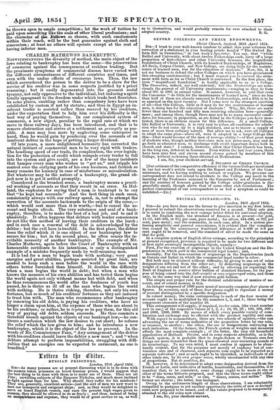OXFORD COLLEGES AND THEIR ENDOWMENTS.
Christ Church, Oxford, 26th April 1854. Sia—I trust to your well-known candour to admit into your columns the correction of a statement in your leading article headed " The Oxford Re- form Bill in Committee," in last week's Spectator. You say, that "while Balliol and University, with about twelve Fellowships each, carry off a large proportion of first-classes and other University honours, the magnificent foundations of Christ Church, with its hundred Studentships, of Magdalene, All Souls, Corpus Christi, and New College, are doing little for the mainte- nance of learned men, less for the education of students." Now, Sir, it is not my business to defend the other Colleges on which you have pronounced this sweeping condemnation ; but I must request you to contrast the state- ment with facts as far as Christ Church is concerned. In the first place, the term " magnificent foundation" is hardly applicable to us as a College. The Canonries, indeed, are well endowed ; but the Studentships are noto- riously the poorest of all University emoluments,—ranging as they do from about 301. to 1001. in annual value. It cannot, however, be said that even the Canonries " do little for the maintenance of learned men," since no less than half of them are already annexed to Professorships, and a fifth is to be so annexed on the next vacancy. But I come now to the strangest assertion of all—that this College, little as it may do for the maintenance of learned men, is doing less for the education of students ! Why, Sir, there are never fewer than one hundred and fifty men receiving education here—generally more ; and among these, though there may not be so many successful candi- dates for honours, in proportion, as are found in the Colleges you have men- tioned, there is an obvious reason for this difference. At a small College, like Balliol or University, it is very easy to refuse all candidates for admis- sion who do not come up to a high standard, and so to insure a supply of men of more than ordinary talents. But allow me to ask, were all Colleges to adopt the same plan—above all, were it adopted in a large College like this—what would become of the men of average ability ?—of that great mass of students who, though neither first-class men nor prize-men, may and do go forth as educated men, to discharge with credit important duties both in church and state ? I cannot, however, allow that Christ Church has been, in the long run, deficient in honours. Even within the last four years, there have been nine first and eleven second classes gained by members of this College, without reckoning those obtained at Moderations.
I am, Sir, your obedient servant, A STUDENT OF CHRIST CHURCH.
[Our estimate of the comparative efficiency of the various Colleges mentioned in our last week's article rests upon the Report and Evidence of the Com- mis' slaters, and we having nothing to retract or explain. We presume our correspondent does not intend to attribute to the College any merit in the learning of the Professors annexed to the Canonries by act of Parliament ; and the number of honours gained by the College under-graduates is dis- gracefully small, though above that of some other rich foundations. The perfect contentment of our correspondent is as bad a symptom as could be exhibited.—ED.]


























 Previous page
Previous page